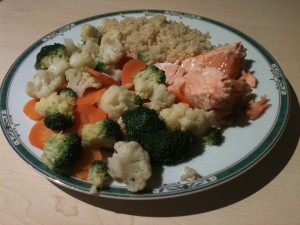 Two weeks ago, in part 2, I told you about my visit to Dr Séjean, a touchy-feely encouraging nutritionist from Martinique. She basically told me to cut out all wheat-based products for three weeks and divide my plate into four: ½ protein, ½ carbs (the contents of a Chinese bowl) and ½ cooked vegetables (cooking and storage tips in part 3). The result was astonishing. I’d lost 2 ½ kilos and 4 cm from my waist and tummy! She’d also told me to note down everything I ate. Of course, this in itself caused me to modify my diet. What’s more, it hadn’t seemed difficult at all because there wasn’t anything I wasn’t allowed to eat (apart from wheat). I could still have côte de boeuf and oysters on Sunday.
Two weeks ago, in part 2, I told you about my visit to Dr Séjean, a touchy-feely encouraging nutritionist from Martinique. She basically told me to cut out all wheat-based products for three weeks and divide my plate into four: ½ protein, ½ carbs (the contents of a Chinese bowl) and ½ cooked vegetables (cooking and storage tips in part 3). The result was astonishing. I’d lost 2 ½ kilos and 4 cm from my waist and tummy! She’d also told me to note down everything I ate. Of course, this in itself caused me to modify my diet. What’s more, it hadn’t seemed difficult at all because there wasn’t anything I wasn’t allowed to eat (apart from wheat). I could still have côte de boeuf and oysters on Sunday.
Many of you have talked to me about your weight problems since the last post and one of the main concerns seems to be binge eating. Once I started the diet, I no longer had a problem with that, but as I explained in part 1, I had been listening to hypnosis tapes for a few months and I’m sure they were extremely effective. However, it does seem that making sure you get enough protein, particularly at breakfast, can definitely help.
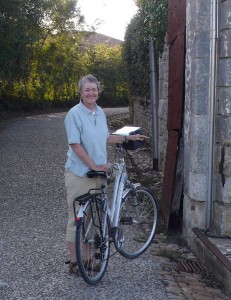 There are various ways to combat the urge to binge. First, you need to analyse what’s causing the problem. Most people binge from stress so you need to find a way to destress yourself. Relaxation cassettes, yoga, exercise, cycling, soaking in a hot bath, having a shower, going on a buying spree, having a cup of tea – there are all sorts of things you can do instead of eating. It takes one month to change a habit, Leonardo tells me, so if you can get past that first month, you’re halfway there. One method that I had found useful in the past was to go and sit in a comfortable chair if I felt the urge to raid the fridge. I’d close my eyes and breathe deeply, thinking zen thoughts. After a few minutes, the urge would disappear. Most of the time.
There are various ways to combat the urge to binge. First, you need to analyse what’s causing the problem. Most people binge from stress so you need to find a way to destress yourself. Relaxation cassettes, yoga, exercise, cycling, soaking in a hot bath, having a shower, going on a buying spree, having a cup of tea – there are all sorts of things you can do instead of eating. It takes one month to change a habit, Leonardo tells me, so if you can get past that first month, you’re halfway there. One method that I had found useful in the past was to go and sit in a comfortable chair if I felt the urge to raid the fridge. I’d close my eyes and breathe deeply, thinking zen thoughts. After a few minutes, the urge would disappear. Most of the time.
And one thing to remember – it’s not because you binged one day that all is lost. If you really want to lose weight and not put it back on, you have to be nice to yourself. OK, so today you ate all those biscuits or foie gras or whatever. But tomorrow’s another day. In fact, tomorrow is the first day of the rest of your life! Pretty good, huh? It means you can always begin again.
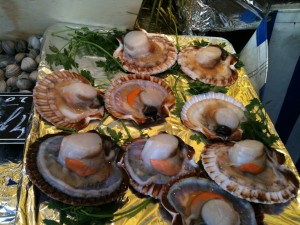
Doctor Séjean looked at the list of what I’d eaten during the previous two weeks and noticed that I didn’t eat much fish. What I like is seafood (especially oysters on Sunda and coquilles Saint Jacques), reef fish and salmon, not those insipid white fish you find in France. If you have to add beurre nantais, there doesn’t seem to be much point in eating bar (bass) instead of entrecôte. However, I had tasted raw fish in the form of capaccio in Venise the year before and figured I could give it ago.
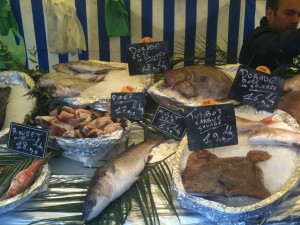
I soon discovered that most fish is overcooked, particularly in restaurants and that when it’s raw, it’s delicious. Also, it doesn’t smell out the kitchen. I’d ask the fishmonger on the market each week for the freshest fish and had soon tasted practically everything tartare, sprinkled with a bit of lemon and olive oil. And after about a year, I started liking it lightly cooked as well. Now we buy different types of fish on the market on Sunday that we eat at each lunch and dinner until Tuesday night. I mainly like mackerel, limande (lemon-sole), rouget (red mullet), carrelet (plaice), lotte (monk-fish) and turbot, and I dislike colin (hake) and cabillaud (cod). I prefer bar (bass), dorade (sea-bream) and tuna uncooked. I deep-freeze fresh salmon and defreeze it and cook it in the microwave. It’s really easy and delicious when it’s not overcooked. So I guess that I now eat fish at about half my meals.
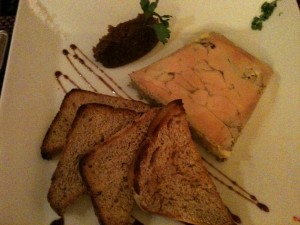
But Christmas was coming up and I was a bit worried about putting back on my newly-lost kilos. Dr Séjean told me not to worry, that I should just make sure that if I drank alcohol, I always ate something with it. That was a surprise but she explained that the food absorbs the sugar whereas if you just have a glass of wine by itself, you store the calories immediately. She said that if I ate foie gras (as if I wouldn’t!) I should have it with toasted bread and, generally speaking, if I was going to have bread, I should have it toasted whenever possible because that way, it doesn’t have a bloating effect.
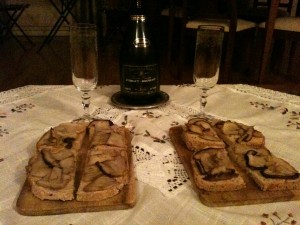
We were planning a few côtes de boeuf of course but she advised me to eat them with vegetables and not just potatoes, for example. She reminded me not to forget the carbs and said I could re-introduce wheat-based foods after another week. But in the meantime, I’d got used to eating quinoa and polenta so I wasn’t really missing the wheat very much except for home-made fresh bread. Another thing she told me is that I should have at least 2 tablespoons of oil a day.
Having recharged my batteries, I took another appointment for a month later. Watch out for Part 5 and let me know how it’s going!
Polenta recipe Polenta is really simple to make. You boil 2 cups of water in a saucepan then add 1/2 cup of polenta stirring quickly with a whisk. It thickens almost immediately. Pour into a recipient (such as a Ziploc) until it’s solid then put it in the fridge for a couple of hours. Tip out onto a board and slice horizontally so that it’s about 1 ½ cm thick. Cut into large squares. Cook in a little oil until the outside is brown and crisp. The Natural Skinnies and Us How I lost 20 kilos after 50 – for good: Part 1 How I lost 20 kilos after 50 – for good: Part 2 How I lost 20 kilos after 50 – for good: Part 3 How I lost 20 kilos after 50 – for good: Part 5 How I lost 20 kilos after 50 – for good: Part 6Don’t forget to subscribe to new posts – that way you’ll get them directly on your smart phone or in your mail box! And I love to hear your comments!




I have so enjoyed following your weightloss after 50 posts. It has provided just the incentive I have needed. I have followed your lead. Yesterday saw a dietitian (who also is a personal trainer) and today a hypnotherapist. Now I need to put it into practice… sigh… Thankfully the dietitian like Dr Séjean ‘allows’ favourite foods.
Bon courage! That’s wonderful. I’m sure it will work. Even during our month’s holiday in Italy in May (I began the diet in November), I didn’t put on any weight and still enjoyed the food!
Good call.
I engaged a dietician last week and, after five days, am feeling really good.
She provided me much the same advice as yours did. (Make up of plate; substituting some non-wheat carbs; drinking more tea, etc)
I am male, nearing 60, nearing retirement and really have to end a quarter century of poor portion sizes and less than ideal exercise.
I have a whole new focus. I aim to be long term.
Glad I found your 3+ year old blog!
Welcome to Aussie in France! And good luck with ending a quarter century of poor portion sizes and less than ideal exercise.
I started writing a food and drink diary on http://www.myfitnesspal.com 17 months ago (April 1, 2014). I have lost more than 20kg this period and over 35kg since my peak weight in 2006.
I am not racing too fast but I put my hand out for some Medicare supplied dietician and psychologist support to build motivation as I close in on retirement.
Well done! I think taking it slowly is the key. After all, the idea is not just to lose weight (and, wow! 35 kg) but to develop healthier eating habits and not put the weight back on. I also believe that psychologist support is essential at some time to eliminate negatives and build motivation.
The anticipation of being supervised/watched by two clever young practitioners has given me a sense of excited anticipation that someone who cares (albeit paid to care) is going to monitor my weigh in every four weeks and care about where I am headed diet-wise and offer me planning and advice.
This is a real winner concept for me as now (at 59yo) I can no longer go back to being the one male in a room of 35-55 women at a weekly Weight Watchers or slimming-club meeting. It’s NOT that the convenors there don’t care; they do. It’s just that it’s hard to pitch to the one male and the teenage boy in the room when the predominant target audience for Weight Watchers, Simple Slimmers and slimming-club is women 24-54 years.
Sadly, about half those clubs’ members are repeat members. God knows, I was! People who are not naturally skinny make great recidivists! [My thought but you may use it without copyright. (-: GRIN]
I think having a nutritionist is a great idea. It certainly worked for me! I can’t even remember seeing any males at Weight Watchers. I even felt sorry for the young women who were so outweighed (no pun intended) by the older recidivists!
Reminds me of a story I heard in 2012:
There was a very lovely woman who had a penchant for cheering up her out of sorts friends. One day she sent ten different puns to each person in her group of a dozen or so friends, with the hope that at least one of the puns would make them laugh.
No pun in ten did.